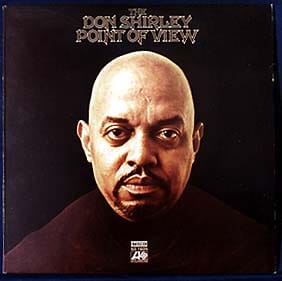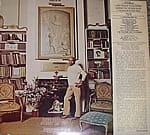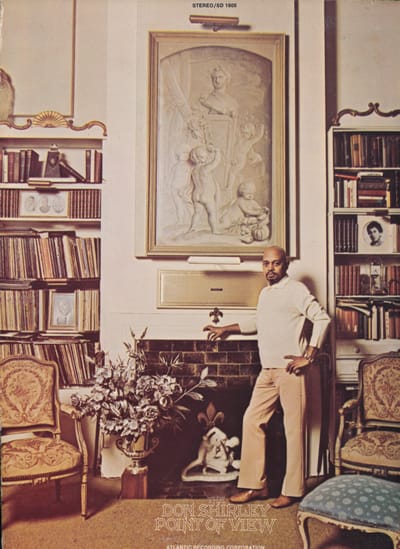 |
 |
 |
 |
Don
Shirley - Point of View
Atlantic SD1605
|
 |
Don Shirley on piano & organ, with Kenneth Fricker on bass, and James Boyd and Juri Taht on cello.
Side 1
1. The Warning, by Don Shirley
2. Carry me Back to Old Verginny, by James A. Bland
3. Bridge over Troubled Water, by Paul Simon
4. The Shadow of your Smile, by Paul Francis Webster & Johnny Mandel
Side 2
5. Alfie, by Burt Bacharach & Hal David
6. Gershwin Medley, by George Gershwin
7. By the Time I get to Phoenix, by Jim Webb
The Gershwin Medley includes the melodies from the following:
1) May Man's Gone No, 2) I Got Plenty O' Nuttin', 3) It Ain't Necessarily So, 4) Strawberry Women, 5) Summertime,
6) Oh Bess
Where's my Bess, 7) I Loves you Porgy, 8) Bess you is my Woman Now, 9) Clara, Clara,
10) Bess you is my Woman Now
|
 |
|
 |
Side One
1. THE WARNING (By Don Shirley; Walbridge, BMI.
Time: 8:00)
2. CARRY ME BACK TO OLD VIRGINNY (By James A.
Bland; E. B. Marks, BMI. Time: 4:45)
3. BRIDGE OVER TROUBLED WATER (By Paul Simon;
Charing Cross, BMI. Time: 6:50)
4. THE SHADOW OF YOUR SMILE (By Paul Francis Webster
& Johnny Mandel; Miller, ASCAP. Time 5:13)
Side Two
1. ALFIE (By Burt Bacharach & Hal David;
Famous, ASCAP. Time: 3:28)
2. GERSHWIN MEDLEY (By George Gershwin; Gershwin-New
Dawn, ASCAP. Time: 15:30)
MY MAN'S GONE NOW
I GOT PLENTY O'NUTTIN'
IT AIN'T NECESSARILY S0
STRAWBERRY WOMAN
SUMMERTIME
OH BESS, WHERE'S MY BESS
I LOVES YOU PORGY
BESS YOU IS MY WOMAN NOW
CLARA, CLARA
BESS YOU IS MY WOMAN NOW
3 BY THE TIME I GET TO PHOENIX (By Jim Webb;
Dramatis, BMI. Time: 3:07)
The personnel is:
Don Shirley, piano & organ;
James Boyd & Juri Taht, cellos;
Kenneth Fricker, bass.
Recorded at Atlantic Recording Studios, New York,
N.;
Recording & re-mix engineer: Gene Paul
Photography: Joel Brodsky
Album design: Haig Adishian
PRODUCED BY JOEL DORN
Back in 1954 Don Shirley was playing at a New York
night-club called BASIN STREET. One evening I was
taken there to hear him by Al "Jazzbo"
Collins, a disc-jockey at Radio Station WNEW, New
York. From that time on, I have never ceased to be
amazed by the prodigious talent of Don Shirley. As a
musician, I am constantly overwhelmed by his
technical virtuosity and his imaginative creativity.
As a human being, I am often moved by his lyricism,
sometimes—I am not ashamed to say—to the point
of tears.
Don Shirley's real greatness lies, I believe, in his
creativity. His version of a song is not an
arrangement—it is a recreation—a new
composition. It is his impression of the original in
terms of his own means of expression—just as a
painter paints his impression of a subject in terms
of his own means of expression.
The means of expression Don Shirley uses are as many
and varied as the influences which contributed to
his development. He was born of highly intellectual
parents—he spent six years studying piano and
composition at the Leningrad Conservatory—he spent
a short time as a practicing psychologist—he has
the same admiration for Ellington, Gershwin and Ray
Charles as he has for Chopin, Rachmaninoff and
Debussy. All these influences—and many more—create
the uniqueness of his musical expression.
However, because of this uniqueness Don Shirley does
not fit any of the "pigeon hole"
categories into which show business likes to put
people. Although he makes use of the jazz idiom, he
cannot be called a "jazz pianist."
Although he makes use of the blues and gospel
idioms, he cannot be called a "blues
pianist" or a "gospel pianist."
Because he makes use of classical idioms and often
develops thematic material in the manner of a
serious composer, he cannot be called a
"popular pianist." Because he devotes his
performing and creative talents to songs of the
people—folk songs, blues, gospel songs, spirituals
and pop songs—he connot be called a
"Classical pianist." What is he
then? I say he is a uniquely talented creative
artist--perhaps a genius--who brings an
extraordinary musical experience to anyone who
listens to him with an open mind and an open heart.
Archie Bleyer
'01~ 114~,V_111 |
|
|
|

